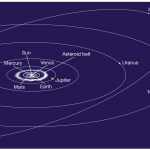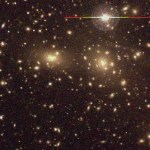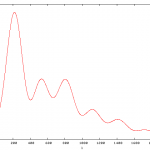MOND
Time magazine just ran an article "Cosmic Fuggedaboudit: Dark Matter May Not Exist At All" - a revisit of the MOND hypothesis.
The story keys off the recent article by Ibata on the Andromeda dwarf galaxies (sub) arXiv pdf, and here is the full ApJ article on arXiv.
Independent of these recent developments, it highlights the continued persistence of the notion that maybe Cold Dark Matter needs to be revisited.
Sean had good discussion of the issues over at Cosmic Variance last year, and recently Kroupa started a blog, the The Dark Matter Crisis, now at scilogs.com/the-dark-matter-crisis/
For…
"The cosmos is all that is or ever was or ever will be. Our feeblest contemplations of the Cosmos stir us—there is a tingling in the spine, a catch in the voice, a faint sensation, as if a distant memory, or falling from a height. We know we are approaching the greatest of mysteries." -Carl Sagan
If you looked out at the planets in the Solar System orbiting our Sun, you'd expect that if you know where they are right now and how quickly they're moving, you can figure out exactly where they're going to be at any time-and-date arbitrarily far into the future. That's the great power that comes…
"Forget it. I didn't have that thing inside me where I wanted to smash against somebody and watch them break. I was too sensitive for that and disliked being that sensitive." -Josh Brolin
How do you figure out what something is made of? You take it apart -- cracking it open if necessary -- and look inside. This is something we've been doing since... well, since before our ancestors were even human.
Images credit: Elisabetta Visalberghi.
For most things here on Earth, that's easy enough. If you wanted to go down to the smallest scales possible, however, it becomes harder and harder to "crack…
The universe remains a mysterious place, and one of the biggest mysteries confronting astronomers today is that "the amount of mass we can see through our telescopes is not enough to keep galaxies from spinning apart." Since the 1930's, this shortfall has been covered by dark matter, a hypothetical substance which has never actually been observed. On the Weizmann Wave, we can consider an alternative called MOND (Modified Newtonian Dynamics) which "posits that gravity works differently on the intergalactic scale." In fact, University of Maryland researcher Stacy McGaugh recently published…
Dark matter - that invisible stuff that is supposed to make up some 20% of the Universe - was thought up to explain a puzzling observation. The amount of mass we can see through our telescopes is not enough to keep galaxies from spinning apart. The existence of great quantities of hidden mass would provide the gravitational pull needed to form those galaxies and enable them to rotate in the way that they do.
But not everyone is willing to buy the idea that the Universe is cloaked in "invisible cloth." An alternate theory, first put forward by Weizmann Institute astrophysicist Prof. Moti…
Last week, Pamela Gay over at Star Stryder pointed me to a press release which claimed that, among other things, perhaps dark matter wasn't necessary. So I wrote a guest post on her blog explaining why it was. Apparently, some people still aren't convinced. So I will lay out for you all the reasons I can think of why we need it, and explain what happens if you try to do without it.
1. Cluster Velocity Dispersions. When we take a look at galaxies, we often find hundreds or even thousands of them clustered together, like in the Coma Cluster. We can measure how quickly those galaxies are moving…
The first serious advocate of modifying Newton's laws instead of postulating unseen (or dark) matter was Moti Milgrom, from whom today a new article appears on the astrophysics preprint archives.
In particular, Milgrom asserts the following:
MOND predictions imply that baryons alone accurately determine the full field of each and every individual galactic object. These predictions are contrary to the expectations in the DM paradigm in view of the following:
a. the haphazard formation and evolution of galactic objects,
b. the very different influences that baryons and DM are subject to during…




